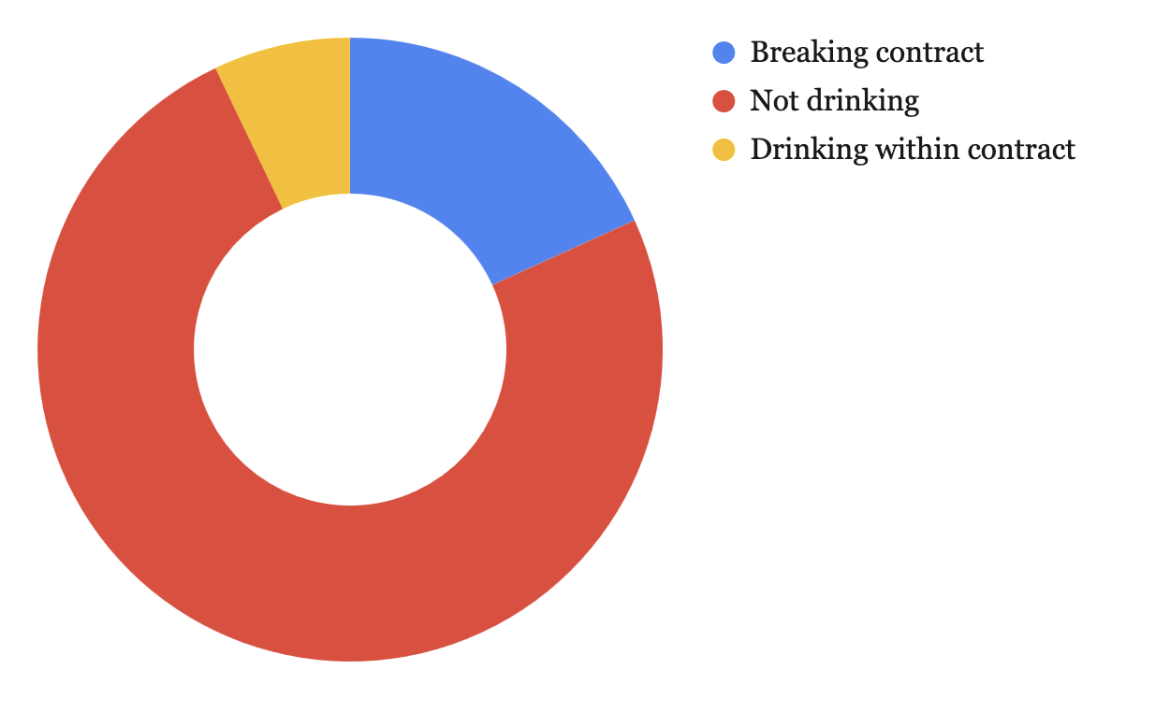Nearly one in five students at Covenant drink, breaking contract, according to a survey released by the Bagpipe last Saturday.
Students self-reported as having had alcohol at local restaurants, at home or off-campus at a friend’s home. Thirteen percent of them said that they have even had alcohol on campus.
Of the 170 Covenant students who responded to the survey, 18.2% said they drank alcohol, 74.7% said they had never drunk alcohol, and an additional 7.1% indicated they had drunk alcohol but indicated that this has been on breaks, May terms, or during communion.
Students offered a range of ideas about the possible purposes of the ban. Preventing drunkenness was a frequent response, and 60 students said it was for the purpose of safety or “protecting students.” Students also cited drunk driving and sexual assault as consequences of consumption.
Secondary to safety, students said the ban was intended to create a more studious atmosphere. “[The purpose of Covenant's alcohol policy is] to maintain an environment that promotes learning and focus, rather than a ‘party-school environment,’” one student said.
Other students suggested that the goal is to create a healthier community and unite the student body, instead of dividing it between students who can drink and those under 21 who cannot.
Possible reasons also included encouraging students to be more healthy and responsible, demonstrating good Christian conduct, and preventing temptation and sin in the student body. Some poll-takers also mentioned liability and legal issues Covenant might face if alcohol were more openly allowed even off campus.
According to Jon Wylie, the purpose of the Standards of Conduct, “is to protect both individuals and the community.” Like many students, he cites the statistical increases in “sexual assault/harassment, vandalism, destruction of property, date rape, car accidents, fights and lower GPA.” Wylie said the college calls for the ban while “acknowledging this is an extra-biblical standard that students must agree to and abide by while at the school.”
Professors said that concerns regarding alcohol have always been a topic of conversation.
“I did come back from that experience actually very thankful for contract, just in the sense that my interactions with my fellow students tended to be more creative in the ways that we spent our time, and in the things that we talked about. It just really changed the way we related, I think in a healthy way,” said Dr. Heather Hess (‘09), an alumna and professor of English.
Dr. Bill Davis (‘82), an alumnus and professor of philosophy also appreciated the creative ways students found to fill their time without alcohol. Davis said he believes the purpose of the policy is to promote an academic atmosphere. “When I compare what student life is like here to what it's like at places where students are having the full American college experience, we just have more consistently good conversations, late at night, on the weekends, and when people are talking about ideas. They make more academic progress. I think they also make more spiritual progress.”
Dr. Matt Vos (‘90), an alumnus professor of sociology, talked about safety on the mountain, specifically mentioning there are more cars on campus now than when he was a student.
Vos and Davis both recognized the tension and frustration students would feel being adults, yet being told not to do “adult” things, but also pointed out (along with some other professors) that it is really only a year to go without alcohol.
Dr. Elissa Weichbrodt (‘04), an alumna and professor of art and art history mentioned Covenant could do better explaining why the policy exists.
“I don't know that we do a great job of making it a shared liturgy and saying we're all buying into this contract together. And here's why it is good for us to assent to this as a community of people, because it feels when you're just signing it by yourself on the computer screen or I mean, we just did a little form, we stick it back into a pile that doesn't create a sense of accountability to each other.”
Around 70 students expressed frustrations, concerns and areas they’d like to see changes made in the policy, and oddly, a number of students that have not broken contract disagree with the policy.
Fourteen respondents indicated mixed feelings.“It seems reasonable. Although it strikes me odd that married or off-campus students over a certain age are essentially held to professor rules regarding alcohol,” a student wrote.
Of students polled, 36 said students 21 and older should be permitted the opportunities for responsible off-campus drinking. Many remained in favor of a dry campus, but said the college shouldn’t control off-campus choices.
“Alcohol should not be permitted on campus for a plethora of obvious reasons, but as long as students aren’t showing up exhibiting signs of drunkenness on campus … their reasoning for not allowing students to drink off campus on their own time is ludicrous. Similarly to a lot of their policies, [the college is] just trying to police people,” a student wrote.
The student body holds a wide range of opinions and gave a lot of pushback on the existing policy. But considering it’s long standing policy, alcohol probably won’t make an official debut on campus anytime soon.


